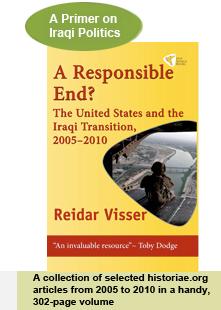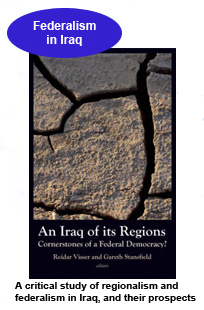



| Main | |
| Documents & images | |
| Links | |
| Contact | |
 | |
| amazon.com |

|
|
|
amazon.com
amazon.co.uk |
|

|
|
|
amazon.com
amazon.co.uk |
|
The “Withdrawal Treaty” Is Passed
By Reidar Visser (www.historiae.org)
27 November 2008
Today’s vote in the Iraqi parliament related to the bilateral relationship between the United States and Iraq is likely to be reported in the Western media as a case of “Shiites” giving certain concessions to “Sunnis” in exchange for their support for a deal on the withdrawal of US forces. That is not an accurate account of what has been going on in the Iraqi parliament over the past few days.
What has taken place is that various Iraqi opposition forces inside the parliament have discovered the concept of leverage. Since 25 November there have been persistent reports that groups often critical of the Maliki government such as Tawafuq (Sunni Islamist), al-Hiwar al-Watani, al-Iraqiyya (secularist) and Fadila (Shiite Islamist) were demanding a “reform charter ” (wathiqat al-islah) in return for their support of the government regarding the Status of Forces Agreement (SOFA) with the US. Among the key demands was a pledge by the government to work to reform the constitution and the political system of the country more generally, as well as committing to revisit the laws relating to the general amnesty law and the treatment of former Baathists and to work for the reintegration of the awakening councils (al-sahwat) in the Iraqi security forces.
It should be mentioned in this context that George W. Bush never managed to use leverage in the negotiations with the Iraqi government over bilateral relations. Instead, during the course of one year, his administration essentially performed an unconditional reversal of its Iraq policy, silently moving from its traditional resistance against timetables for withdrawal to accepting a framework that means full withdrawal within 3 years, with no opening even for the “residual forces” that also pragmatists among the Democrats have enthusiastically defended. One year ago, Washington had leverage over Maliki because he was still weak: he needed American support so that he could achieve better control of the Iraqi security forces and thereby enhanced control over internal challengers to his rule. In 2008, without asking for any favours in return, the Bush administration gave him this in the shape of a continuation of “the surge”. Moreover, by performing a “surge” with no built-in requirements for political reform, Washington consistently enhanced Maliki’s leverage in the very negotiations that were simultaneously going on between the two sides. As a result, today Maliki is strong enough to adopt a different formula: he still wants to exploit American support to the maximum in terms of strengthening Iraqi security forces, but he is now in a position to relate to the pressures from Iraqi nationalism that necessitate a full withdrawal, and probably thinks that in the long run it may be better for him to rely on a different survival strategy, without the Americans by his side. In a very optimistic scenario, this might involve some kind of constitutional reform (most likely in the direction of a greater degree of centralism south of Kurdistan, as Maliki seems to be cognisant of the growing appeal of anti-federalism in Iraq). But based on his past actions, it seems doubtful that Maliki realises the need to also abolish the system of sectarian domination through ethno-sectarian quotas (muhasasa), and without this kind of profound overhaul of the Iraqi system, an American withdrawal in the context of a Maliki government could mean a turn to greater authoritarianism or even covert or tacit Iranian support.
The developments in the Iraqi parliament today very much went in the direction Maliki wanted them to go, even if the opposition managed to create at least a degree of friction. Three votes were held. First, a “decision” (qarar) was adopted, which reflected the demands of the opposition parties. Among other things, it called for an intensification of efforts towards revising the Iraqi constitution, steps towards rebuilding the Iraqi security forces on a “national basis”, integration of the awakening councils in the security forces, and a more general outreach to groups currently outside the political process that are prepared to give up armed resistance. It remained more than anything a statement of intent (and the document is punctuated with caveats – the integration of the sahwat, for example, should also be “according to the government programme”) and as such today's package of legislation is sadly reminiscent of many of the deals that have been cut with the Maliki government since 2006: it bestows ample privileges on the Iraqi government in return for promises of reform that are both vague and without a clearly defined timeline. Still, at least it succeeded in keeping these issues on the agenda. In the end, Fadila decided not to show up for the vote and disassociated itself from the deal (dismissing it as “barter”), but it is clear that the party had been interested in the attempt to establish a link to political reform a couple of days ago, and the demands for systemic reform in Iraq (ranging from the constitution to the integration of the sahwat) are Fadila demands as much as they are “Sunni” demands.
Subsequently, two separate votes were held, on the SOFA and the broader “strategic framework” between the United States and Iraq, both of which were adopted with solid majorities reflecting the deal between the government parties and parts of the opposition (144 versus 35 votes is indicated in one report), although the SOFA (or the "withdrawal treaty" as pro-government Iraqis like to call it) is subject to a popular referendum to be held before 30 July 2009. The strategic framework has received less attention as a separate document; it is less specific and contains little that the Maliki government will worry about as most of the clauses are woolly and generally go in the direction of committing US support for the Iraqi government in sectors such as health, the economy and culture.
All in all, it seems significant that the government decided to give in to the demands for a promise of reform. Resistance within the government was quite strong: Abbas al-Bayati, an Islamist with close ties to the Islamic Supreme Council of Iraq (ISCI), yesterday thundered against any linking of the issues (and any tampering with the constitution), and Kurdish representatives voiced similar objections. Nonetheless, the Maliki government eventually did agree to the adoption of a “decision” on reform that had been demanded by many of the same parties of the cross-sectarian 22 July Forces that were behind the challenge to the government during the debate on the provincial powers law earlier this year. The “decision” itself is so bland that one can discuss whether this is another victory for the 22 July forces or rather represents the co-optation of parts of it (Iraqiyya, al-Hiwar al-Watani and the more reluctant parts of Tawafuq) to work within the very system of ethno-sectarian quotas that they reject in principle. Nevertheless it does seem promising that the opposition in the Iraqi parliament in this case managed to turn a fragmented and sometimes ambivalent sense of protest into coherent demands and concessions from the Iraqi government that at least will keep issues like constitutional reform on the agenda and thereby could help set the stage for a more profound debate on these issues before the parliamentary elections in 2009.
Copyright © 2005-2008 historiae.org & Reidar Visser
This document or quotes from it may be freely reproduced as long as www.historiae.org is credited as the original source.
